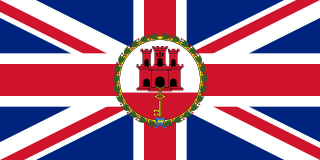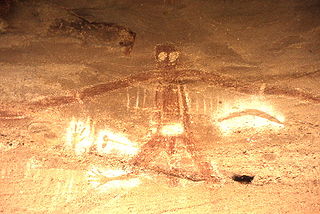Related Research Articles

Communications in Gibraltar comprise a wide range of telephony systems, Internet access, broadcasting and satellite control. There is also printed and online media. Regulation of telecommunications and broadcasting are the responsibility of the Gibraltar Regulatory Authority (GRA), established by means of the Gibraltar Regulatory Authority Act in 2000.

In the United Kingdom, a scheduled monument is a nationally important archaeological site or historic building, given protection against unauthorised change.

In the United States, a national monument is a protected area that can be created from any land owned or controlled by the federal government by proclamation of the president of the United States or an act of Congress. National monuments protect a wide variety of natural and historic resources, including sites of geologic, marine, archaeological, and cultural importance. The Antiquities Act of 1906 gives presidents the power to proclaim national monuments by executive action. In contrast, national parks in the U.S. must be created by Congressional legislation. Some national monuments were first created by presidential action and later designated as national parks by congressional approval.

The governor of Gibraltar is the representative of the British monarch in the British overseas territory of Gibraltar. The governor is appointed by the monarch on the advice of the British government. The role of the governor is to act as the de facto head of state. They are responsible for formally appointing the chief minister of Gibraltar, along with other members of the government of Gibraltar after a general election. The governor serves as commander-in-chief of Gibraltar's military forces and has sole responsibility for defence and security. Although recent appointments have all been former military personnel, most being former Royal Navy or Royal Marines flag officers, Sir James Dutton resigned from the role in 2015, complaining that it was "more representational and ceremonial than I had expected".

The Antiquities Act of 1906 is an act that was passed by the United States Congress and signed into law by Theodore Roosevelt on June 8, 1906. This law gives the president of the United States the authority to, by presidential proclamation, create national monuments from federal lands to protect significant natural, historic, or scientific features. The Act has been used more than a hundred times since its enactment to create a wide variety of protected areas.

The Environment Protection and Biodiversity Conservation Act 1999(Cth) is an Act of the Parliament of Australia that provides a framework for protection of the Australian environment, including its biodiversity and its natural and culturally significant places. Enacted on 17 July 2000, it established a range of processes to help protect and promote the recovery of threatened species and ecological communities, and preserve significant places from decline. The Act is as of September 2024 administered by the Department of Climate Change, Energy, the Environment and Water. Lists of threatened species are drawn up under the Act, and these lists, the primary reference to threatened species in Australia, are available online through the Species Profile and Threats Database (SPRAT).

The Gibraltar Broadcasting Corporation (GBC) is Gibraltar's public service broadcaster. It has provided the community with a radio and television service since 1962.

Lesbian, gay, bisexual, transgender, and queer (LGBTQ) rights within the British Overseas Territory of Gibraltar have evolved significantly in the past decades. Same-sex sexual activity has been legal since 1993 and the age of consent was equalised to 16 in 2012. The Supreme Court of Gibraltar ruled in April 2013 that same-sex couples have the right to adopt. Civil partnerships have been available to both same-sex and opposite-sex couples since March 2014, and in October 2016, Gibraltar voted to legalise same-sex marriage with the Civil Marriage Amendment Act 2016 passing unanimously in Parliament. The law received royal assent on 1 November and took effect on 15 December 2016.

An Australian Aboriginal sacred site is a place deemed significant and meaningful by Aboriginal Australians based on their beliefs. It may include any feature in the landscape, and in coastal areas, these may lie underwater. The site's status is derived from an association with some aspect of social and cultural tradition, which is related to ancestral beings, collectively known as Dreamtime, who created both physical and social aspects of the world. The site may have its access restricted based on gender, clan or other Aboriginal grouping, or other factors.

The Ministry for Culture and Heritage is the department of the New Zealand Government responsible for supporting the arts, culture, built heritage, sport and recreation, and broadcasting sectors in New Zealand and advising government on such.
Devil's Fall is a cave in the British Overseas Territory of Gibraltar. It was a prehistotic shelter and is listed and protected by the Heritage and Antiquities Act 2018.
General elections were held in Gibraltar on 26 November 2015 to elect all 17 members to the third Gibraltar Parliament. Chief Minister Fabian Picardo announced the date of the election on Monday 19 October 2015 during a speech on the Gibraltar Broadcasting Corporation.

European Parliament elections were held in the British Overseas Territory of Gibraltar on 23 May 2019. They were held as part of the European Union-wide elections after the date of United Kingdom withdrawal was delayed by the UK government. This was Gibraltar's final participation in a European Parliament election before the withdrawal took place on 31 January 2020.

The Investigatory Powers Act 2016 is an Act of the Parliament of the United Kingdom which received royal assent on 29 November 2016. Its different parts came into force on various dates from 30 December 2016. The Act comprehensively sets out and in limited respects expands the electronic surveillance powers of the British intelligence agencies and police. It also claims to improve the safeguards on the exercise of those powers.
Same-sex marriage has been legal in Gibraltar since 15 December 2016. A bill for the legalisation of same-sex marriages was approved by the Parliament on 26 October 2016 and received royal assent on 1 November 2016. Gibraltar was the sixth British Overseas Territory to legalise same-sex marriage, after South Georgia and the South Sandwich Islands, Akrotiri and Dhekelia, the British Indian Ocean Territory, the Pitcairn Islands, and the British Antarctic Territory.

The European Union (Withdrawal) Act 2019, also known as the Repeal Bill is an Act of the Gibraltar Parliament announced by Chief Minister Fabian Picardo, that transposed directly-applicable European Union law into the law of Gibraltar as part of the UK's exit from the European Union (Brexit). It has the same effect as the European Union (Withdrawal) Act 2018.
Lesbianism in Gibraltar became legal in 1992.
General elections were held in Gibraltar on 12 October 2023 to elect all 17 members of the fifth Gibraltar Parliament. This was the first election in Gibraltar's history to use an electronic voting count system. The GSLP–Liberal Alliance secured a fourth term in office, though it saw its majority reduced to one seat, whilst the GSD became the sole opposition party, gaining two seats.

A referendum on partially legalising abortion was held in Gibraltar on 24 June 2021. The referendum question was whether to enact the Crimes (Amendment) Act 2019, which allows abortions up to 12 weeks if the woman's mental or physical health is at risk. It also allows abortion later if the woman's life is at risk, to prevent "grave permanent" mental or physical injury, or if there is a fatal fetal abnormality. It had originally been scheduled for 19 March 2020, but was postponed on 12 March 2020 due to the COVID-19 pandemic. The proposal was approved by 63% of voters.

The Three Strikes Legislation Repeal Act 2022 was an omnibus Act of Parliament passed by the New Zealand Parliament that repealed the elements of the Sentencing and Parole Reform Act 2010, which constituted the so-called three-strikes law. The bill passed its third reading on 9 August 2022 with the support of the governing Labour Party, the allied Green Party, the Māori Party but was opposed by the opposition National and ACT parties. The following year the Sixth National Government took power and pledged to reinstate the three strikes law. On 13 December 2024, the Government passed legislation reinstating three-strikes legislation in New Zealand, effectively reversing the 2022 repeal legislation.
References
- 1 2 3 4 "Heritage Trust welcomes new laws". Gibraltar Chronicle . 27 July 2018. Retrieved 23 November 2024.
- 1 2 "Govt set to publish 'Heritage and Antiquities' act this month". Gibraltar Chronicle . 20 November 2017. Retrieved 23 November 2024.
- ↑ "Heritage and Antiquities Bill". Laws of Gilbraltar. Retrieved 23 November 2024.
- ↑ "Heritage and Antiquities Act". Laws of Gibraltar. Retrieved 23 November 2024.
- ↑ "Heritage Trust welcomes new Heritage and Antiquities bill". Gibraltar Broadcasting Corporation . GBC News. 29 March 2018. Retrieved 23 November 2024.
- 1 2 "New heritage and antiquities legislation published". Gibraltar Broadcasting Corporation . GBC News. 26 March 2020. Retrieved 23 November 2024.
- ↑ "City Wall names being repainted". Gibraltar Panorama. 12 May 2020. Retrieved 23 November 2024.